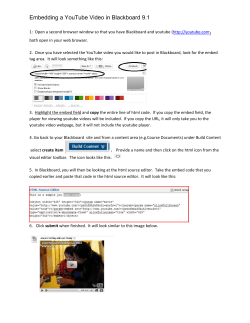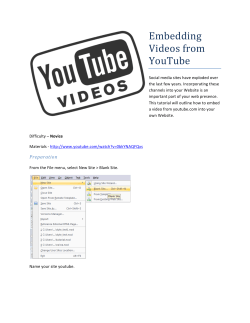
AVMA Council Nominations Videos
AVMA Council Nominations Videos We strongly encourage you to coordinate and seek assistance in producing your video from your nominating organization, if applicable. YouTube guidelines Before you film your video, make sure you’re in a well-lit room and that you like the way you look on-screen. Do your clothes and hair look OK? What about your makeup (if applicable)? And, almost as importantly, how does the background look behind you? Pay attention to what others might see in the video other than you, and remove objects that may be too distracting or could create an unwanted reaction on the part of the viewers. You may want to make a test video (or several) on your computer to make sure things look okay, and to practice your speech. Consider having a friend or colleague review your practice video(s) with a critical eye to give you constructive feedback. In your video, make sure to state your name, the position you’re seeking, and give us some background information about yourself. Why are you interested in running? What attributes would you bring to this group? What makes you qualified for this position? Also, please avoid disparaging other candidates or focusing on other candidates’ perceived flaws. We want to know why you would be the best fit for the position, not why you believe another candidate isn’t qualified. The maximum length for your video is two minutes. We can overlook a few extra seconds – say your video is two minutes and ten seconds – but you will be asked to shorten and resubmit your video if it is excessively long. Avoid using copyrighted material, such as music – this could trigger a response from YouTube that challenges your right to post the video. Uploading your video to YouTube Before you start the uploading process, know where you stored the video file on your computer. Is it in a folder, or on your desktop? Knowing where it is will save you the hassle of looking for it when you’re in the uploading process. Also make sure that if you recorded several versions, you know which one you want to upload; that way, you’ll spare yourself the frustration of uploading the incorrect video and then having to upload the correct one. If you don’t have a YouTube account (they’re free), you can sign up for one by going to www.youtube.com and clicking on the blue “Create Account” button on the lefthand side of the screen. Follow the steps on the screen and you’ll be set up with an account and ready to go. If you already have a Gmail account, you already have a YouTube account, so you can bypass this step. Just click “Sign In” and sign in to YouTube with your Gmail username and password. Once you’ve signed in, it’s time to upload your video. Just click on the link at the top right side of the page that says “Upload.” If you haven’t uploaded a video to YouTube before, you’ll have to set up a channel before you’re allowed to upload the video. Follow the instructions on the screen (if you already have a YouTube channel, you can skip this step). A channel is a page with all of the videos you’ve created and uploaded to YouTube. In naming your channel, it may be a good idea to name it after yourself – for example, “John Smith’s Channel.” You’ll then be asked to select your gender, and to check the boxes at the bottom of the page that ask if you’d like others to be able to find you by your email address, and if you’d like to receive email newsletters from YouTube. This is entirely up to you. Once you have a name for your channel and have made your selections, click the button that says “Next.” Then you’ll see the Upload page: Click on the button that says, “Select files from your computer.” Important: YouTube accepts only certain file formats, but you shouldn’t be too worried about not having the right format. Most modern webcams, camcorders, and digital cameras output video in one of the following formats that YouTube accepts: WebM files .MPEG4, 3GPP and MOV files .AVI .MPEGPS .WMV .FLV Clicking the “Select files from your computer” button will bring up a box where you can navigate to the video’s location on your computer. Find the folder, select the correct video, and click on “Open.” Your video will begin to upload. Then you’ll see an area where you can fill in information like a video title and other settings. The title of your video should be “[Your Name] – [Position You’re Seeking].” Once your video is done uploading, you’ll see a link to it. When you click on that link, it’ll take you to the video page. Please wait for the video to process before you click the link. YouTube will let you know when it’s done processing; since your video will be short, it probably won’t take more than a couple of minutes (depending on the speed of your internet connection) to upload and process your video. If the upload fails, you’ll receive a notice to try the upload again (this is uncommon with short videos, unless there’s a technical problem with the file or file type). The link to the video is what you’ll send to us. Click on the “Share” button underneath your video, and copy and paste the link in that box in an email to us at OfficeEVP@avma.org. This is what it should look like once you click the “Share” button: Please keep in mind that your video will be public. If you are uncomfortable with your video being public, you can change the settings so only people with the link can see it. This is not a guarantee of privacy, but the only way someone could see your video is if you have given the link to him or her. In order to change the privacy settings for your video, you should see something that looks like this above your video. Click on the “Edit info” button: Once you click “Edit info,” another menu will appear on the screen. Select the “Settings” button, then choose the option for “Unlisted (only people with the link will see the video).” Then click the blue button marked “Save changes.” (You do not want to select “Private” because that means only you will be able to see the video.) This resource on YouTube may provide you with additional help when it comes to uploading your video. If you experience any other issues with uploading, YouTube has some troubleshooting advice. Steps for making your YouTube “Unlisted” 1. Once you are logged into your YouTube account, you will see an option for Video Manager in the upper right hand corner of the screen. 2. Click on Video Manager and then Videos Uploaded. 3. You’ll then see a screenshot and name of the video you’ve uploaded. 4. Select the Edit option, listed beneath the video. 5. Select the Privacy option and select Unlisted. This will only allow those people to whom you send your video link to be able to access your video. Disclaimer: Because of the wide variety of recording methods and software programs, we cannot provide technical support for the video recording process. If you have questions about your webcam, camcorder, digital camera or other recording device or software, we recommend you contact the manufacturer or a computer specialist for assistance.
© Copyright 2025





















